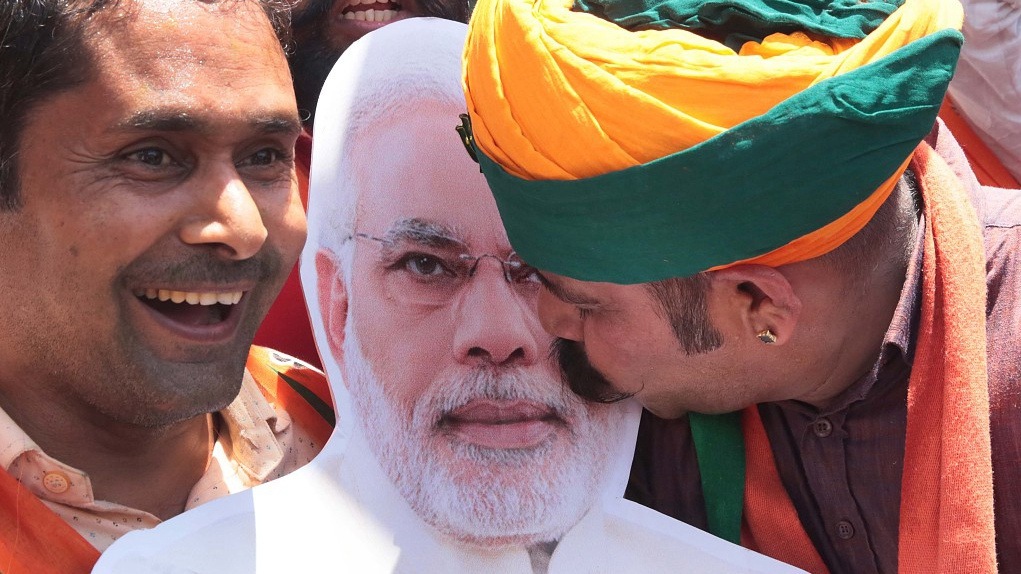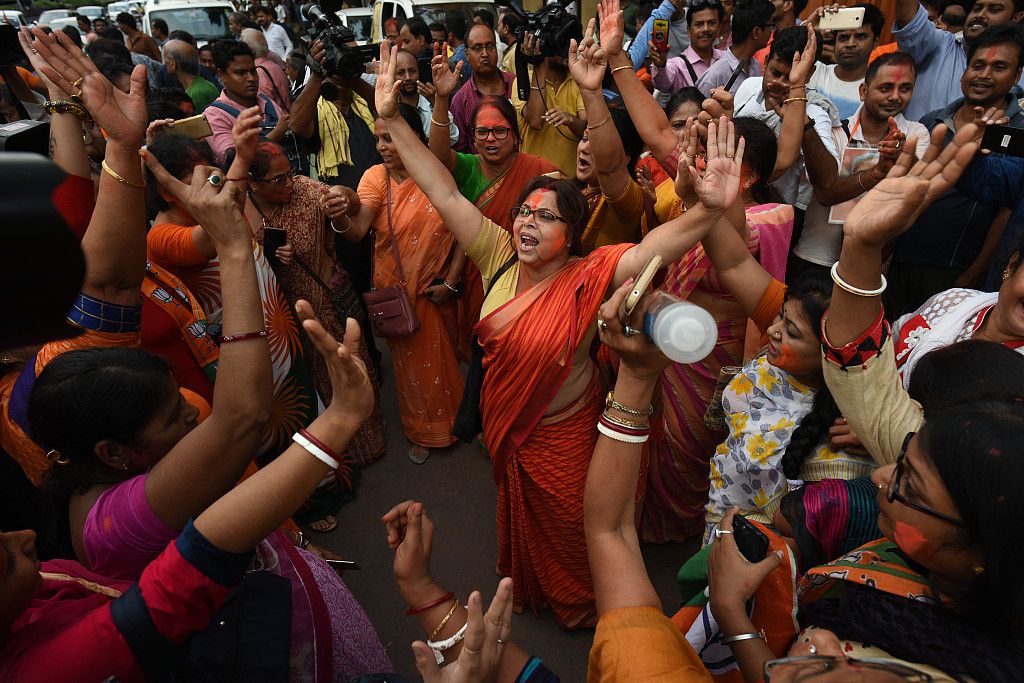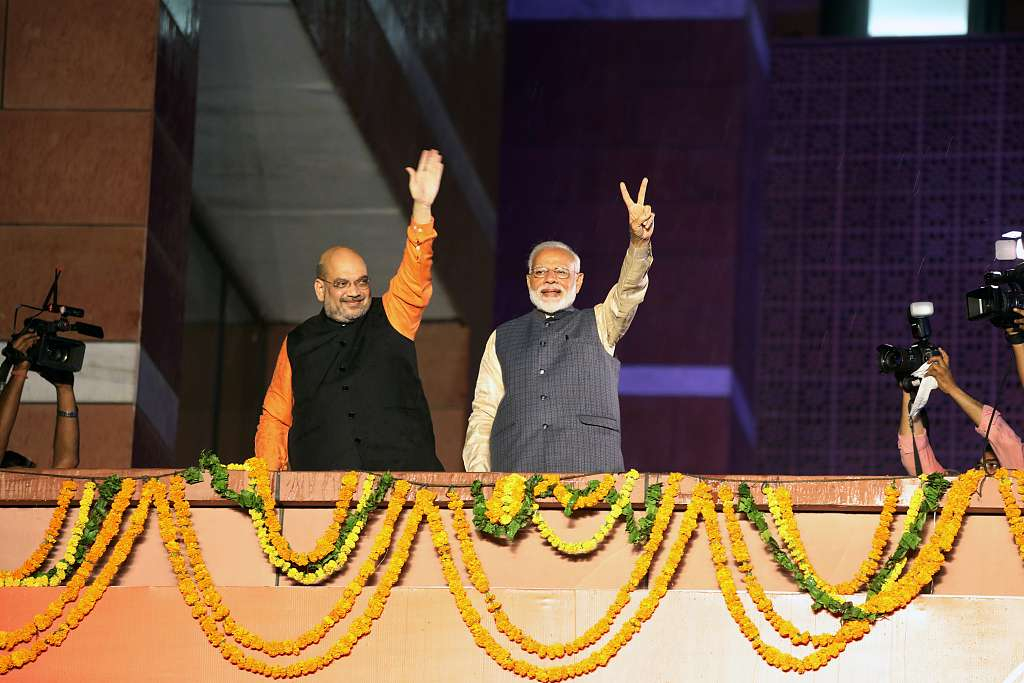
Opinion
10:53, 25-May-2019
Welcoming Modi's re-election
Mahendra Subedi

Editor's Note: Mahendra Subedi is a Nepali journalist currently in Beijing. The article reflects the author's opinion, and not necessarily the views of CGTN.
With the landslide victory in the election, Indian Prime Minister Narendra Modi's Hindu nationalist Bharatiya Janata Party (BJP) is once again at the helm of the India's state power. Winning 300 plus seats out of 543 constituencies, the right-wing leader is back to power again by thrashing the Indian Congress with a more resounding victory than the 2014 elections.
Modi, also known as NaMo in India, has become the third Indian politician after Jawaharlal Nehru and Indira Gandhi to return to power with a sweeping victory in the parliamentary polls.
After the result's official announcement from India's Election Commission, Modi is expected swear in as the country's prime minister for another five-year stint. Nevertheless, Modi has a bumpy road ahead as he is inundated with many priorities both at home and abroad.
Indians, particularly the 10 million first-time voters, have pinned high hopes on Modi. Besides satiating their development thirst, Modi has the challenge to fight against serious unemployment, rampant corruption and poor infrastructure.
Despite his win, the opponents repeatedly raised their concerns on high inflation, poor delivery on governance and the Modi government's failure on job creation. It is noted that Modi had promised to create 20 million jobs every year but, unfortunately, the unemployment rate there was soaring in the last two decades.

Bharatiya Janata Party (BJP) supporters celebrate the Lok Sabha election results in Kolkata, India, May 23, 2019. /VCG Photo
Bharatiya Janata Party (BJP) supporters celebrate the Lok Sabha election results in Kolkata, India, May 23, 2019. /VCG Photo
Therefore, meeting the basic expectations at home is the major challenge that Modi is obvious to face. Moreover, Modi has the challenge to bring the non-Hindu communities, women, Dalit and other backward communities on board the mainstream by upholding their dignity because he is accused of being too illiberal to those communities.
Modi's impressive victory clearly signals the formation of a new set of social coalitions, which has expressed its faith in India's strong leadership on regional issues. For them, Modi is the best pick compared to any other Indian leader.
However, threats loom large for further polarization in India's fluid societies because dozens of regional political forces have bagged sizable number of votes despite their failure to make it to the parliament.
Besides, with his election for the second term, Modi has to rev up economic growth, ensure rural farmers' income and win the confidence of marginalized people. This is vital because Modi's landslide victory is supposedly backed by corporate interests and capitalists.
Now, Modi should rigorously work on certain pressing issues. Firstly, to meet his commitments made during the election campaigns, he should come up with tangible action plans to hammer out the internal contradictions, namely deep-rooted corruption, skyrocketing unemployment and yawning gap between the rich and poor.

Bhartiya Janata Party (BJP) President Amit Shah (L) and Indian Prime Minister Narendra Modi gesture to the crowd during an event at the party's headquarters in New Delhi, India, May 23, 2019. /VCG Photo
Bhartiya Janata Party (BJP) President Amit Shah (L) and Indian Prime Minister Narendra Modi gesture to the crowd during an event at the party's headquarters in New Delhi, India, May 23, 2019. /VCG Photo
Modi's preliminary statement made after the election results are welcoming as he has said, "The faith placed in our alliance is humbling and gives us strength to work even harder to fulfill people's aspirations."
The second, yet equally serious, assignment that Modi needs to undertake is cobbling up India's shaky relations with its neighboring countries including China, Nepal, Pakistan, Myanmar and Bangladesh. This is because Modi's rise has lasting implications for India but also for all South Asian nations and elsewhere in the world.
Modi is expected to move ahead by cooperating with China in key global and regional issues including fostering bilateral trade and business, promoting multilateralism and pushing for reforms in WTO system.
Therefore, despite his win in the election, the upcoming Modi government has to clear many stumbling blocks to unite the already politically divided populous nation and uplift the millions of impoverished by maintaining his leadership mettle at the global stage.
Let's cross fingers for Modi's re-election and caution him to work for the greater good of the great Indian civilization and humankind. Chances are high for Modi to work in the making of the Asian age with joint collaboration of other giant Asian economies.
(If you want to contribute and have specific expertise, please contact us at opinions@cgtn.com.)

SITEMAP
Copyright © 2018 CGTN. Beijing ICP prepared NO.16065310-3
Copyright © 2018 CGTN. Beijing ICP prepared NO.16065310-3